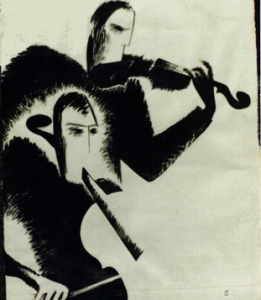Nature of the Fugue: Blues Mondo
Published in: 02. Trustworthiness of Experience
Fugue—a style of musical composition with multiple voices, its structure based on the sequential repetition, by various voices, of a single theme.
The form is monotonous and therefore generally monothematic (various sides of a single complex form). The initial musical style is usually maintained to the end.
Characterized by development according to a set tone and function, and by the presence of hidden voices.
(from a dictionary)
There are also faces and phenomena having value, having passed a cycle of development, shaped in the course of their own experience. Their function and character are set. But falling into new interaction, accepting new laws, they attain a different meaning, are born again to grow, flower and reach new maturity, now and then in an unconventional combination revealing unexpected traits.
There’s no reason to look for analogies — they’re everywhere. Any feature may be taken as the basis for comparison. Independence is no more than a choice of dependence. Is there a dependence free of prescribed curtsying? Perhaps the luxury of emerging fully formed isn’t quite so useless?
Emergence fully formed. Love. Method.
— Enough. Everything fits.
Who said this is eclectic?
It’s not eclectic, it’s a fugue.
“Now there are diversities of gifts, but the same spirit.” (1 Cor. 12:4)
(Illustration: T. Apraksina: Poster. Pen and ink, 1988.)

Speak Your Mind